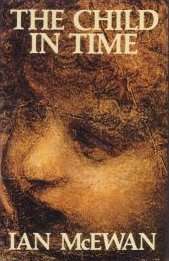The Child in Time
 First edition cover | |
| Author | Ian McEwan |
|---|---|
| Country | UK |
| Publisher | Jonathan Cape |
Publication date | 1987 |
| Media type | Print hardcover |
| Pages | 220 |
| Awards | 1987 Whitbread Novel Award |
| ISBN | 978-0224024990 |
| Website |
www |
The Child in Time (1987) is a novel by Ian McEwan. It won the Whitbread Novel Award for that year. The story concerns Stephen, an author of children's books, and his wife, two years after the kidnapping of their three-year-old daughter Kate. Author Christopher Hitchens viewed the novel as McEwan's masterpiece.[1]
Plot summary
Stephen Lewis is, by his own admission, an accidental author of children's books. One Saturday, on a routine visit to the supermarket, during a moment's distraction, he loses his only daughter, Kate. Since then, the only purpose in his life is that he is a member of a committee on childcare. Otherwise he spends his days lying on the sofa drinking scotch and watching mindless TV programmes and the Olympic games. His wife, Julie, has moved away and become a recluse, and he visits her very rarely. He has a close friend, Charles Darke, who published his first novel and who is now a junior Minister in the Cabinet, and the Prime Minister's favourite. Darke's own wife, Thelma, is a quantum physicist. She engages Stephen with her outlandish theories on time and space. However, his friends' lives change irrevocably in a way he cannot understand, and he is a helpless bystander. Charles Darke and his wife leave their life in London for a place in the countryside, where a few years later, Charles commits suicide.
Stephen experiences a strange event that he cannot explain: he sees his parents as a young couple in a pub, before they married. The book also deals with his grief and eventually his painful acceptance of the loss of his child.
Themes
The book deals with the theory that time is relative, and can be fluid and unstructured. In one respect it can be viewed as a time travelling story. At the very core of the novel is the "child in time" — Stephen himself — appearing to his mother as a child's face at a window, which makes his mother decide not to abort, but instead to continue the pregnancy.
It also explores the way both Stephen's and Julie's lives disintegrate after Kate's disappearance, and how an unexpected event at the very end of the book may bring them back together.
Reviews
Author Christopher Hitchens viewed the novel as McEwan's masterpiece.[1] Writing about McEwan when his novel Saturday was published, Hitchens remarked the break out successes of Amsterdam in 1998 and Atonement in 2001 and then says that The Child in Time was "still, in my view, his masterpiece".[1]
Autobiographical elements
The novel is connected to McEwan's personal life as during the writing of this novel he experienced the birth of his first child.
Adaptation
In February 2017, BBC One commissioned a television film adaptation of the novel starring Benedict Cumberbatch and Kelly Macdonald.[2]
References
- 1 2 3 Hitchens, Christopher (1 April 2005). "Civilization and Its Malcontents". The Atlantic. Retrieved 26 September 2013.
- ↑ Tartaglione, Nancy (15 February 2017). "Benedict Cumberbatch To Star In, Exec Produce 'The Child In Time' For BBC, Masterpiece". Deadline Hollywood.
External links